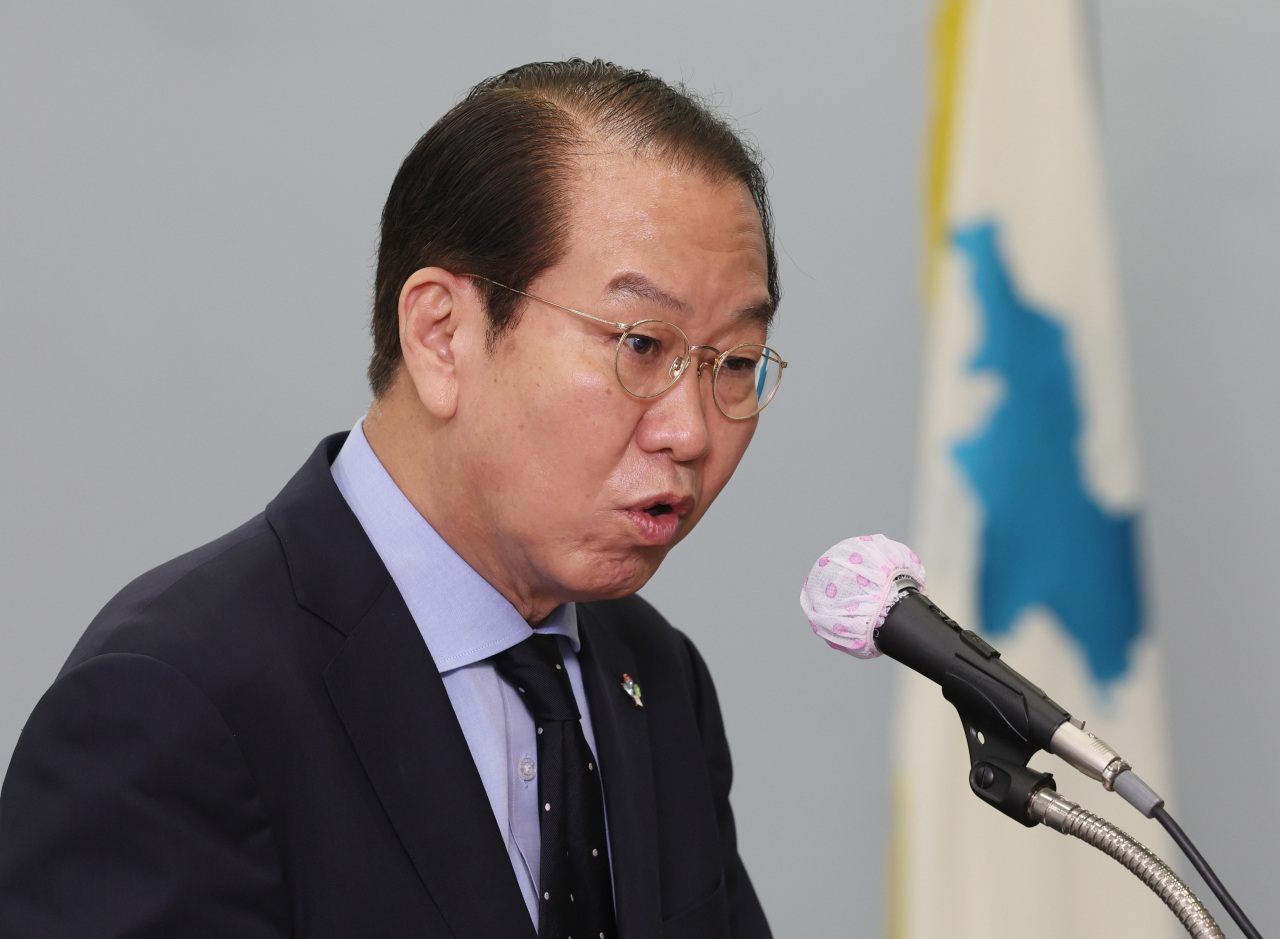South Korea’s Unification Minister will push to expeditiously establish a North Korean human rights foundation which has been postponed for more than six years, but he also clarified that the government will not use the human rights issue as a means to apply pressure on the Kim Jong-un regime.
Unification Minister Kwon Young-se on Tuesday proposed the priority issues he aims to resolve during his term, speaking at his first news conference since his inauguration in May.
Kwon’s goals are to improve inter-Korean relations, devise a North Korea and unification policy in tandem with the international community and the public, and effectively improve the human rights situation in the North.
“This year, I will work hard to launch the North Korean human rights foundation,” Kwon told reporters at the Unification Ministry’s Inter-Korean Dialogue office in central Seoul.
Kwon said he will call on the ruling and opposition parties to “expeditiously reach an agreement on the launch of the North Korean human rights foundation” after they determine parliamentary committee chiefs and other key positions for the latter half of the 21st National Assembly.
The South Korean government enacted the North Korean Human Rights Act in March 2016, laying the legal and institutional groundwork for establishing the North Korean human rights foundation.
But the main opposition Democratic Party of Korea has refused to cooperate in establishing the foundation for more than six years.
The South Korean Unification Minister can appoint two of the 12 directors required to launch the foundation, but the rest should be divided among the ruling and opposition parties.
“If the North Korean human rights foundation is launched, it will solve the humanitarian difficulties of North Korean people based on the foundation‘s functions stipulated in the North Korean Human Rights Act,” Kwon, the four-term lawmaker of the People Power Party, said.
The foundation is tasked with investigating human rights in North Korea and engaging in research and policy development concerning improving North Korean human rights and humanitarian assistance.
Goal of human rights policy The Unification Minister clarified that he disagrees with the opinion that the Yoon Suk-yeol government should use the North Korean human rights issue as a means to ramp up pressure on the Kim Jong-un regime.
Chairman Lee Jun-seok of the ruling People Power Party in mid-June said the government should utilize the North Korean human rights issues as “leverage to put pressure on North Korea.” Kwon did not make direct reference to Lee’s comment, however.
“I will focus on substantially improving North Korean human rights and getting them more in line with global civil rights and universal values,” the minister said.
The Yoon government will not use the human rights issue to “tarnish North Korea’s reputation,” a high-ranking official at the Unification Ministry, who wished to remain anonymous, said in a closed-door briefing following the news conference.
The South Korean government will denounce the North Korean regime for violating human rights. But the criticism solely aims to prevent the recurrence of human rights abuses and improve the human rights situation in North Korea, according to the official.
Death of S.Korean official The high-ranking official also expressed the Unification Ministry’s stance on the investigation of South Korean fisheries official Lee Dae-jun Lee, who was shot to death and burned by the North Korean military near the disputed western maritime border in 2020.
Last week, South Korea’s Coast Guard and Defense Ministry announced that they had not found any evidence that Lee had not intended to defect to North Korea, overturning the Moon Jae-in government’s assessment.
The official said the Unification Ministry will ask the North Korean authorities to cooperate in getting to the bottom of Lee’s death if needed.
“We should do our best to reveal the truth using internal information, but it is necessary to ask North Korea (to cooperate) if we see that we don’t have sufficient information,” the official said.
“It will not be easy in the current situation where there has been no dialogue (between the two Koreas), but we will convey requests by the bereaved families, including site visits, to North Korea in appropriate ways.”
South Korea’s Unification Ministry has not made an official request regarding Lee’s death to North Korea through inter-Korean communications hotlines since its restoration in October 2021.
The official also added that the Unification Ministry will “fully cooperate” concerning the repatriation of two North Korean fishermen captured in South Korean waters in November 2019.
At that time, the Moon Jae-in government made the decision given that the two fishermen were suspected of killing 16 crew members on a squid fishing boat before fleeing to South Korea.
“It was clearly wrong to forcibly repatriate fishermen who were in suspicion of committing a crime against North Korea,” the official said, adding that the decision could violate South Korean law.
“As South Korean citizens, recognized by our constitution, we should have accepted them in light of the damage they would suffer after returning to North Korea.”
(
dagyumji@heraldcorp.com)








![[Today’s K-pop] Blackpink’s Jennie, Lisa invited to Coachella as solo acts](http://res.heraldm.com/phpwas/restmb_idxmake.php?idx=644&simg=/content/image/2024/11/21/20241121050099_0.jpg)